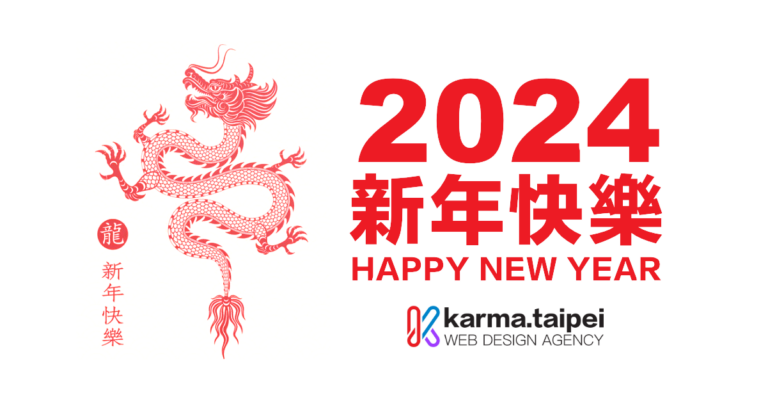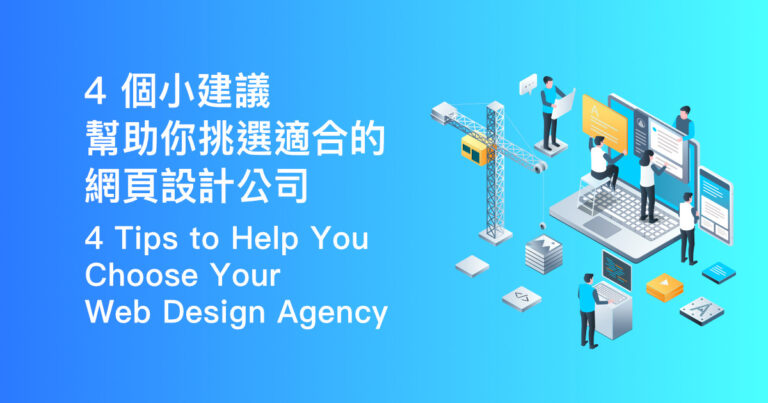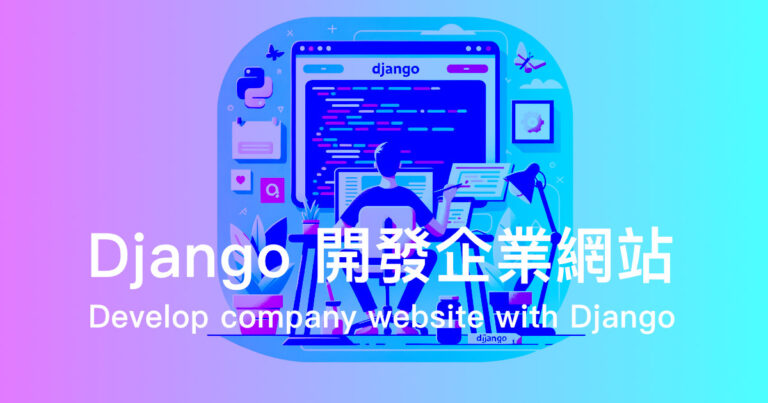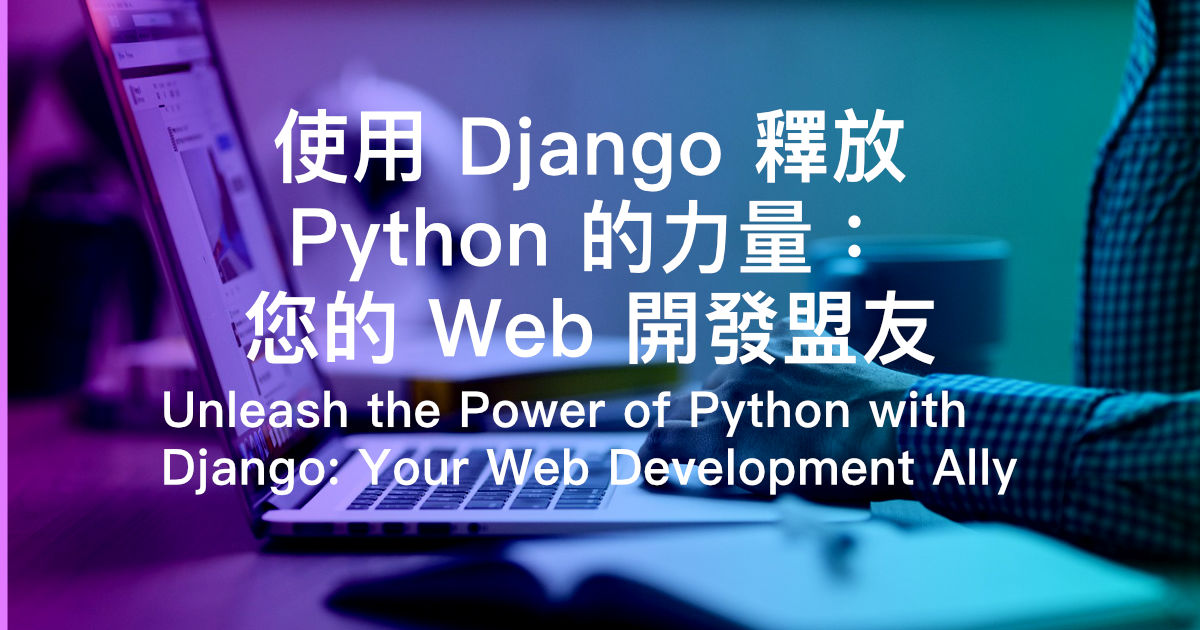
Selecting the right web development framework can feel overwhelming. With countless options on the market, each catering to specific project needs, finding the perfect match is crucial. For many companies and individual developers, the Django framework emerges as a clear frontrunner. Packed with flexibility and power, it’s no surprise Django stands as one of the most popular web development tools today. But what exactly makes it so special? What types of projects does it excel at? Let’s delve into the world of Django and discover why developers worldwide embrace its potential – and how you can join them.
What is the Django Framework?
In a nutshell, Django is an open-source framework built on Python, a top web development language. Its core principles? Simplicity, flexibility, reliability, and scalability. When you dive into Django, you’re not just acquiring a tool; you’re unlocking a whole new way of thinking about Python and its endless possibilities.
Django comes equipped with its own unique naming system for functions and components, like calling HTTP responses “views.” It also boasts an admin panel widely considered more user-friendly than alternatives like Laravel or Yii. But that’s just the tip of the iceberg. Here are some additional highlights:
- Simple syntax: Writing code in Django feels natural and intuitive.
- Built-in web server: No need for additional configurations; Django gets you up and running quickly.
- MVC architecture: Clear separation of concerns for organized and maintainable code.
- “Batteries included” philosophy: Everything you need for common cases is bundled right in.
- Object Relational Mapper (ORM): Interact with your database with ease.
- HTTP libraries: Craft powerful web interactions.
- Middleware support: Extend functionality and customize your application.
- Python unit test framework: Build robust and reliable code.
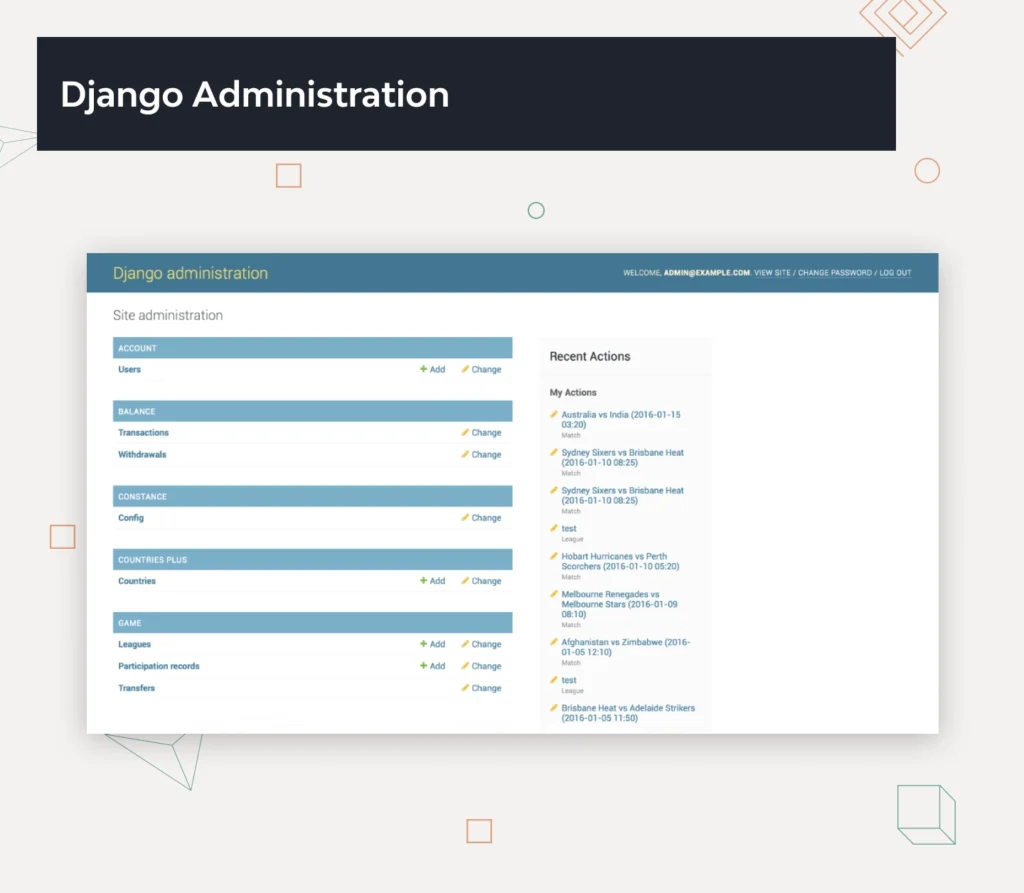
Additionally, Django provides a dynamic CRUD (create, read, update and delete) interface, configured with admin models and generated via introspection. CRUD is used to describe the basic database commands, which means the interface facilitates viewing, changing, and searching for information.
Why Choose Django?
While the Python development landscape offers frameworks like Flask, Pyramid, FastAPI, and Tornado, Django stands out for its unique strengths:
1. Speed and Simplicity: Django prioritizes developer efficiency. Its rapid development principles and “Don’t Repeat Yourself” (DRY) philosophy let you focus on innovation rather than boilerplate code. This translates to faster project completion and more efficient resource allocation.
2. Unwavering Security: Django takes security seriously. Its robust out-of-the-box security features address common vulnerabilities like clickjacking, cross-site scripting, and SQL injection. Moreover, Django is quick to release security patches, ensuring your applications stay protected against evolving threats.
3. Versatility for Any Project: Whether you’re building a simple website or a high-traffic web application, Django has your back. Its comprehensive features and scalability handle large data volumes and heavy user traffic seamlessly. Plus, its cross-platform nature allows you to build on Mac, Linux, or PC environments.
4. A Thriving Community and Ecosystem: Django is backed by a passionate and supportive community. Forums, channels, and dedicated websites offer guidance and resources. Finding help for tricky code issues or hiring experienced Django developers is a breeze.
5. Unmatched Documentation: Django boasts some of the best documentation in the open-source world. It’s clear, concise, and constantly updated to reflect new features and fixes. Learning the ropes and adapting to changes is effortless.
6. Constant Evolution: Django isn’t content to rest on its laurels. The framework is constantly updated with new features and packages, ensuring your development journey remains smooth and enjoyable.
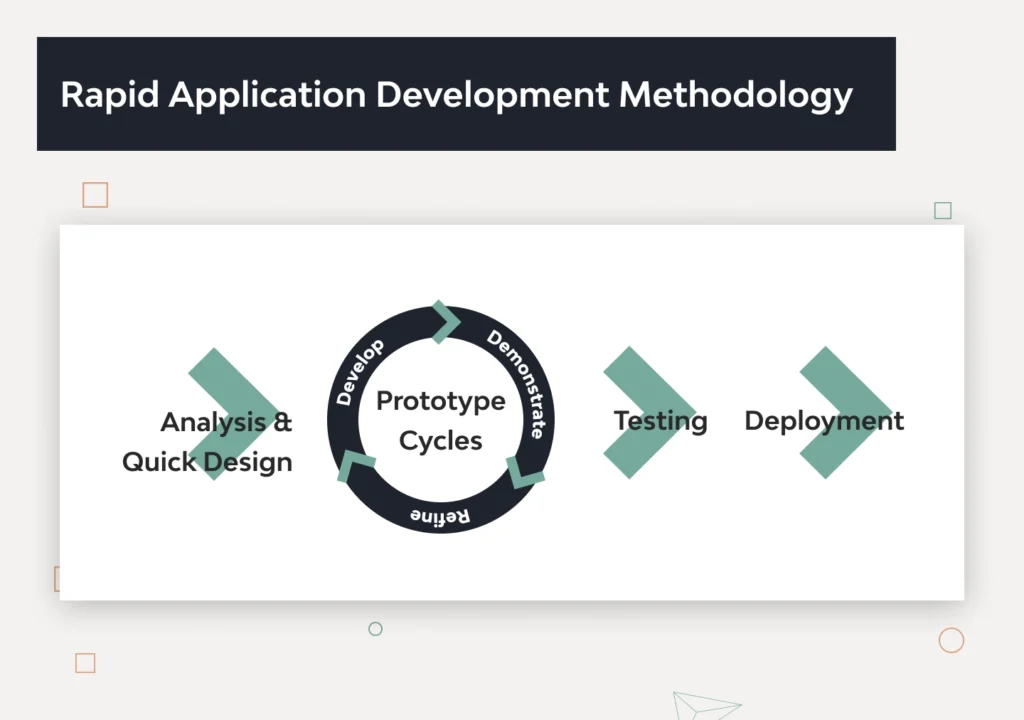
It suits any web application project
With Django, you can tackle projects of any size and capacity, whether it’s a simple website or a high-load web application. Why use Django for your project? Because:
- It’s fully loaded with extras and scalable, so you can make applications that handle heavy traffic and large volumes of information;
- It is cross-platform, meaning that your project can be based on Mac, Linux or PC;
- It works with most major databases and allows using a database that is more suitable in a particular project, or even multiple databases at the same time.
It’s well-established
Django boasts impeccable documentation, consistently maintained and upgraded alongside new features and fixes. This commitment to quality makes it effortless to stay ahead of the curve.
Beyond its technical prowess, Django thrives on a massive and dedicated community. With countless forums, channels, and websites, finding help or skilled developers for your next Django project is a breeze. No matter the challenge, this supportive network has your back.
Whether you’re a seasoned developer or just starting out, Django’s intuitive design makes it a pleasure to use. Clear documentation, helpful communities, and constant updates all contribute to a streamlined development experience.
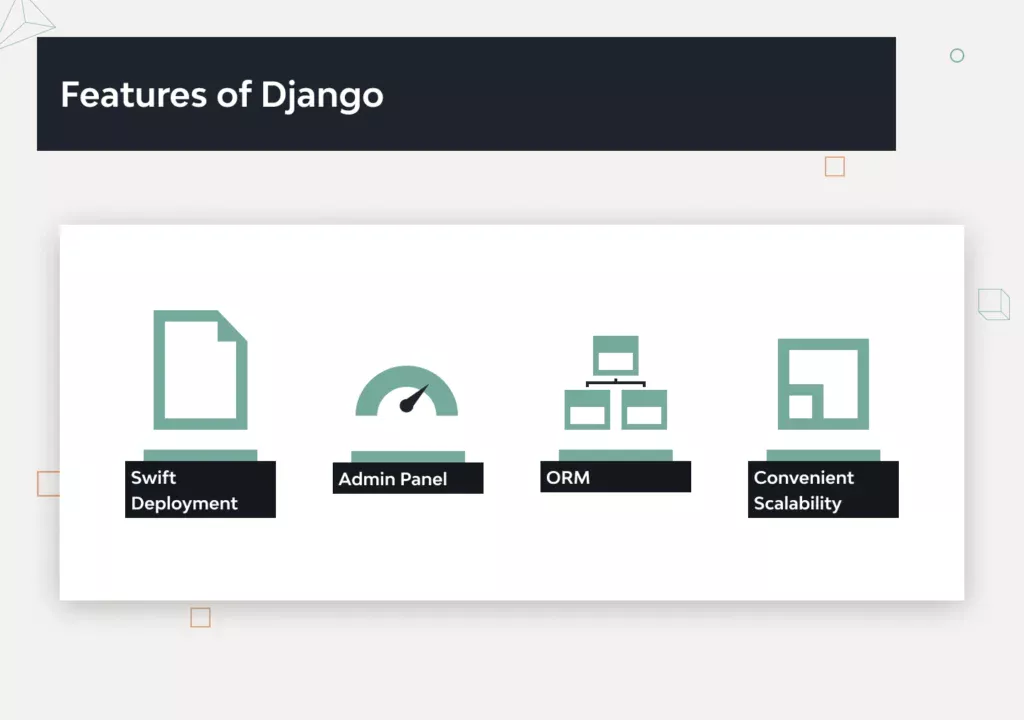
What Can You Build with Django?
The possibilities are truly endless! Django’s power and flexibility empower you to create a wide range of web applications. Remember its newspaper industry roots? It excels at handling content-heavy projects with massive media libraries and high traffic, but that’s just the beginning. Here are some examples of what Django can do:
- Financial platforms: Analyze data, calculate probabilities, and personalize finance tools.
- Custom CRM systems: Organize internal data and streamline business processes.
- B2B communication platforms: Connect businesses and facilitate seamless interactions.
- High-load booking engines: Power booking platforms and online marketplaces.
- Mobile apps: Develop Android and iOS apps that seamlessly integrate with web applications.
- Real estate valuation systems: Create data-driven property evaluation tools.
- Document management systems: Organize and manage documents efficiently.
- Legal platforms: Verify mortgage conditions or manage lease agreements.
Beyond building complete applications, Django can also power specific features within larger projects, such as:
1. Streamlined Communication:
- Automated Email Notifications: Keep users informed with personalized updates, alerts, and confirmations.
- Dynamic Filtering Systems: Implement tailored searches and data exploration with customizable rules and logic.
- AI-Powered Recommendations: Generate personalized content or suggestions based on user preferences and data analysis.
2. Enhanced Business Operations:
- Investment Fund Management Interfaces: Build intuitive dashboards and tools for managing and tracking investments.
- Customizable Admin Dashboards: Gain instant insights and manage operations efficiently with visual data insights.
- Secure Photo Verification Systems: Implement fast and reliable identity verification through photo comparisons.
3. Platform Empowerment:
- Extend CRM and B2B Platforms: Integrate powerful features into existing platforms to streamline workflows and improve communication.
- Build Scalable Online Marketplaces: Leverage Django’s robust infrastructure to create high-traffic marketplaces with seamless transactions.
- Develop Efficient Booking Systems: Design user-friendly booking platforms with secure payments and real-time availability management.
4. Additional Possibilities:
- Integrate real-time chat systems for instant customer support.
- Implement advanced data visualization tools for comprehensive analysis.
- Build custom dashboards for any data-driven application.
- Develop interactive e-learning platforms for efficient knowledge sharing.
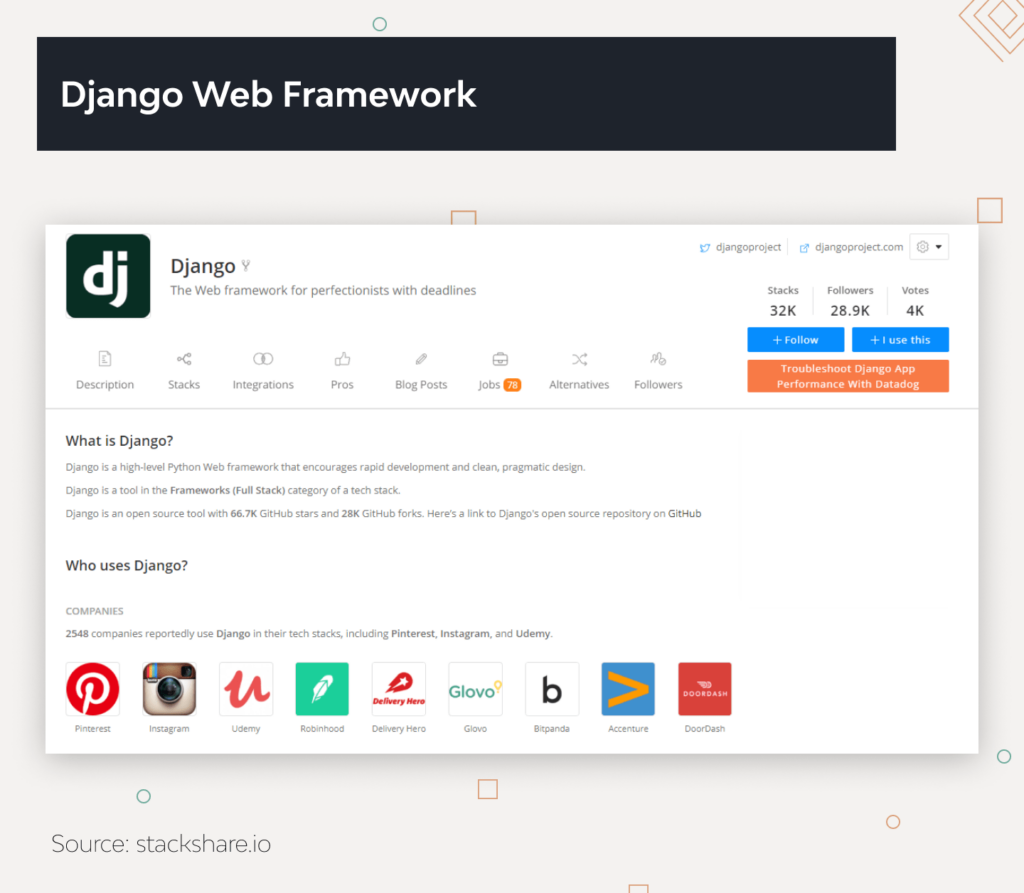
Django: Power-Packing Your Web Dev Projects
Django’s not just a web framework, it’s a developer’s dream come true. This high-level Python powerhouse prioritizes speed, practicality, and flexibility, making it the darling of both solo devs and big businesses. Let’s explore the features that fuel its popularity and effectiveness:
1. Lightning-Fast Development: Django embraces the “Don’t Repeat Yourself” mantra, letting you ditch redundant coding and build apps at warp speed. Say goodbye to wasted time and hello to quicker project completion and efficient resource utilization.
2. All-in-One Toolkit: Forget scrambling for extra tools. Django comes loaded with everything you need, from user authentication to session management. Development becomes smoother, simpler, and a whole lot more enjoyable.
3. Scale Like a Superhero: Whether you’re building a small personal project or a behemoth enterprise app, Django has your back. Its exceptional scalability handles mountains of data and user traffic without flinching, keeping your performance top-notch.
4. Security Built-In: Django takes security seriously. It comes equipped with robust features that automatically guard against common threats like SQL injection and cross-site scripting. Your apps are secure by default, giving you peace of mind.
5. Versatility Unchained: From content management systems and social networks to scientific computing platforms, Django’s versatility knows no bounds. It adapts to any project like a chameleon, empowering you to create whatever your imagination dreams up.
6. Community of Champs: Don’t get stuck in a coding cul-de-sac. Django boasts a thriving community of passionate developers ready to offer support, resources, and even pre-built packages. Finding solutions and collaborating is a breeze with this awesome ecosystem.
7. Testing for Serenity: Worried about buggy code? Django’s built-in testing framework has your back. Write tests at every level to ensure your app is polished, reliable, and error-free. Sleep soundly knowing everything is shipshape.
These are just some of the features that make Django a champion in the web development arena. With its power and flexibility, you can build anything you can imagine, faster and more efficiently than ever before. So, unleash your inner developer and let Django propel your projects to greatness!
Famous Companies That Use the Django Framework
Django is the choice of many, and it’s also the choice of the Internet’s giants. Here are some of the popular web applications enjoy Django’s speed, flexibility, and ease of use:
- Instagram: Another popular social network that deals with a great deal of media data and user interactions. Django enables the functionality that makes the web application work seamlessly, add new features, and fix issues in no time.
- Spotify: A large media library with huge volume of information that allows users to listen to music free of charge or on an ad-free subscription basis. On the technical side of things, Spotify also uses machine learning, where Python is one of the best choices. The creators chose to combine it with the Django framework.
- The Washington Post: It’s no wonder that The Washington Post would use Django to handle its heavy traffic, since the framework itself was created to power an online newspaper. Several other online periodicals also use Django.
- Dropbox: A cloud technology for file storage requires high-performance functionality. Django provides Dropbox with the tools it needs to provide sharing and synchronization, as well as scalability.
- Mozilla: One of the most popular web browsers, and another web application that switched from PHP to Python, and thus to Django. Now, it is better able to handle huge traffic and API hits.
- NASA: They use Django for some of the functional elements that require the most reliability. Their website is not as popular as Instagram, for example, yet it handles high-resolution imagery and an average of 2 million views per month.
- Pinterest: This platform has well over 250 million active users per month, handles huge volumes of media data, and yet manages to sustain its user-friendly interface. Thanks to its open-source framework, the creators were able to modify it to suit their needs.
- Reddit: What’s the first site go to for social news and discussions? For many people, it’s Reddit — a web content platform where people ask questions, share opinions, and where posts are promoted based on a rating system. Reddit relies on Django for many of its functional capabilities, like servicing heavy user traffic.
Intrigued by the possibilities of Django but unsure where to start?
Connect with James Lai at karma.taipei, a seasoned Django expert with over 13 years of experience. He and his team can help you craft efficient, scalable solutions for any need, from content-heavy websites to complex machine learning applications.
James Lai at karma.taipei is your guide. With over a decade of Django mastery, he can untangle complex challenges and build robust, user-friendly applications that elevate your brand.
Take the first step. Drop James a line at karma.taipei and discover how Django can fuel your digital success.
